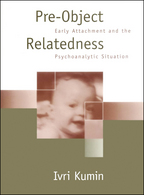Pre-Object Relatedness
Early Attachment and the Psychoanalytic Situation
Ivri Kumin
Hardcover
Hardcover
orderDecember 1, 1995
ISBN 9781572300156
Price: $57.00 240 Pages
Size: 6" x 9"
This volume explores the primitive yet complex emotional world of the baby, a preverbal world that predates memory, symbolic representation, self-reflection, and verbal description. Author Ivri Kumin describes the impact of early relational experiences on the foundation of emotional living, when traumatic developmental interferences can disrupt the infant's emerging capacity for representational thought. Using detailed clinical examples, he explains how these early experiences are enacted within the psychoanalytic situation and how their analysis and mediation enable the patient to think about and emotionally encompass these states for the first time.
Multidisciplinary in his approach, the author integrates infant observational studies and attachment theory with psychoanalytic developmental perspectives. He explores the core concepts of the three major psychoanalytic theories: signal anxiety (ego psychology), projective identification (object relations theory), and affect attunement (self psychology), and explains the unity of their underlying modes of action on the basis of contemporary infant research. The book then applies its understanding of early relatedness to a wide variety of psychoanalytic issues of both theoretical and clinical importance.
Part I of the volume examines the basic language of primary relatedness. Topics covered include early attachment, precursors of internalized object relationships, signal anxiety, and environmental mediation. Chapters in Part II discuss affect transmission, the nature of emotional exchanges in the psychoanalytic situation, fields of identity, creation of representability, and the psychoanalytic mediation of primitive emotional states. Part III addresses pathology, including in-depth examinations of disturbances of pre-object relatedness, ambivalent and avoidant relatedness, the repetition compulsion, trauma and enactment, and the effect of incorrect interpretations.
Synthesizing empirical findings with theoretical and clinical information, this volume is invaluable for psychoanalysts and psychodynamic therapists. It is an ideal text for graduate-level courses in psychoanalytic theory and technique, attachment theory, human development, and psychotherapy of early traumatic states.
Multidisciplinary in his approach, the author integrates infant observational studies and attachment theory with psychoanalytic developmental perspectives. He explores the core concepts of the three major psychoanalytic theories: signal anxiety (ego psychology), projective identification (object relations theory), and affect attunement (self psychology), and explains the unity of their underlying modes of action on the basis of contemporary infant research. The book then applies its understanding of early relatedness to a wide variety of psychoanalytic issues of both theoretical and clinical importance.
Part I of the volume examines the basic language of primary relatedness. Topics covered include early attachment, precursors of internalized object relationships, signal anxiety, and environmental mediation. Chapters in Part II discuss affect transmission, the nature of emotional exchanges in the psychoanalytic situation, fields of identity, creation of representability, and the psychoanalytic mediation of primitive emotional states. Part III addresses pathology, including in-depth examinations of disturbances of pre-object relatedness, ambivalent and avoidant relatedness, the repetition compulsion, trauma and enactment, and the effect of incorrect interpretations.
Synthesizing empirical findings with theoretical and clinical information, this volume is invaluable for psychoanalysts and psychodynamic therapists. It is an ideal text for graduate-level courses in psychoanalytic theory and technique, attachment theory, human development, and psychotherapy of early traumatic states.



